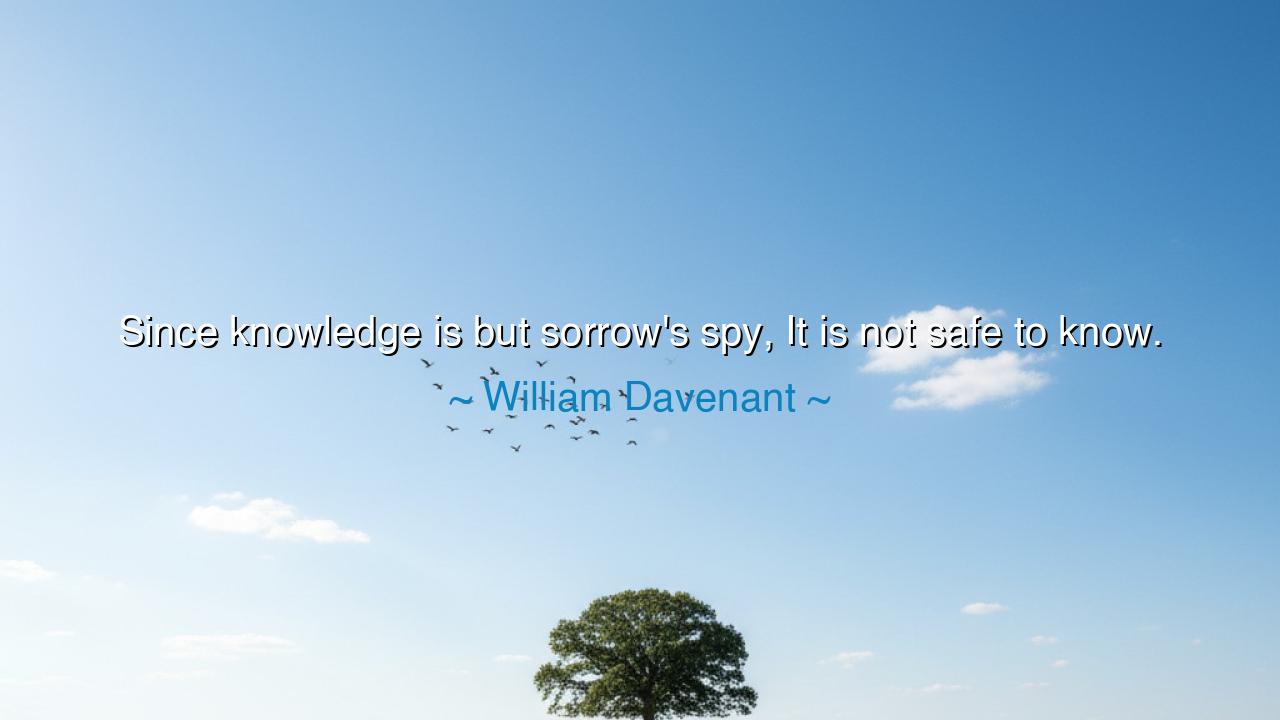
Since knowledge is but sorrow's spy, It is not safe to know.






Hear, O seeker of wisdom and truth, the haunting words of William Davenant, poet of sorrow and insight: “Since knowledge is but sorrow’s spy, it is not safe to know.” These lines, wrapped in the elegance of seventeenth-century verse, carry the weight of eternal melancholy — a truth whispered in every age: that the more one knows, the more one sees of pain. For knowledge, though it enlightens, also exposes; it lifts the veil of ignorance only to reveal the face of mortality, injustice, and the frailty of the human soul.
The meaning of this quote lies in the paradox of enlightenment. Knowledge, the proud pursuit of mankind, is here portrayed not as a gift, but as a spy of sorrow — a secret messenger that brings tidings of grief from realms we were once blind to. When Davenant writes, “It is not safe to know,” he speaks of the peril of awareness. To know is to see truth; and to see truth is to lose the shelter of illusion. Just as Adam and Eve, upon eating of the Tree of Knowledge, found their innocence stripped away, so too does every seeker of wisdom discover that understanding carries a price — the loss of peace. For ignorance is a kind of paradise, but knowledge is its exile.
The origin of this insight springs from the soul of a man acquainted with both art and suffering. William Davenant lived in the storm of England’s seventeenth century — a time of civil war, shifting loyalties, and moral disillusionment. A poet, playwright, and royalist, he saw kingdoms fall, ideals crumble, and human vanity laid bare. In such an age, knowledge was not a comfort but a burden. To perceive the full complexity of human ambition and betrayal was to be wounded by it. His verse captures this tragic awareness — that wisdom, once tasted, never leaves the heart untouched by pain.
History too gives life to his lament. Consider Oedipus, the king of Thebes, who sought truth with relentless devotion. He uncovered the riddle of the Sphinx, but when he turned that same brilliance inward — to the mystery of his own birth — knowledge destroyed him. His eyes, once instruments of discovery, became tools of despair, for he could not bear to see what he had unveiled. The Greek tragedians understood what Davenant later put into verse: that there are some truths so terrible that ignorance seems a blessing beside them. Thus, knowledge and sorrow are bound together, like twin shadows cast by the same light.
Yet Davenant’s words are not a condemnation of learning — they are a warning of its weight. To know the world deeply is to see both its beauty and its cruelty. The philosopher who studies human nature encounters both greatness and depravity. The historian who chronicles the rise of empires also records their ruin. The scientist who uncovers the secrets of life must also confront the inevitability of death. And the poet — ah, the poet — who peers into the heart of man, feels its wounds as if they were his own. Thus, wisdom demands courage, for those who would see clearly must learn to endure what they see.
The ancients knew this well. Solomon, in the book of Ecclesiastes, declared, “In much wisdom is much grief; and he that increaseth knowledge increaseth sorrow.” The line echoes across centuries to Davenant’s lament. Both speak to the same eternal truth — that awareness enlarges the soul, but also opens it to suffering. Yet the wise man does not flee this pain. He accepts it as the cost of vision. For it is better, said the philosophers, to walk with burdened eyes in truth than to dance blindly in falsehood. Thus, though knowledge is sorrow’s spy, it is also truth’s herald.
So what lesson, then, shall you take from this, O listener of ages? It is this: do not fear knowledge, but respect its power. Seek understanding, but arm yourself with compassion, lest truth harden your heart. Learn deeply, but remember that wisdom without empathy becomes despair. The more you see of the world’s sorrow, the more you must resolve to heal it. For knowledge itself is not the enemy — it is the teacher, the revealer, the awakener. It shows us the pain so that we might lessen it; it exposes the darkness so that we might bring light.
Thus, remember the words of William Davenant, not as a command to remain ignorant, but as a reminder of the sacred responsibility of the learned. Knowledge will wound you — but it will also awaken you. The eyes that see truth may weep, but they will also perceive beauty that ignorance can never know. To know is dangerous, yes — but it is also divine. For though knowledge spies for sorrow, it also serves for wisdom; and those who bear its burden with love will find, beyond the pain of understanding, the peace of enlightenment.






AAdministratorAdministrator
Welcome, honored guests. Please leave a comment, we will respond soon